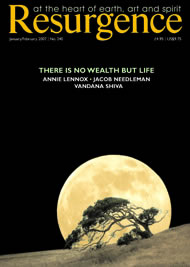SILENCE SPEAKS. Each syllable, loaded with meaning, leads to the truth of things. But we live in a world that ignores the truth about reality. The drug of constant stimulation has brainwashed us to crave ever more distractions of its shallow attention: music and moving pictures everywhere, up-to-the-minute news; instant access to instant knowledge from televisions in every room, the internet or our bleating mobile phones. All of them gadgets to keep us connected, but connected to what?
As John Lane ably illustrates, silence connects us to something more vital: the inner tutor, our ‘in-tuition’; the wise voice that has no truck with fashionable thinking or media sages. Perceived in silence it amplifies what the ancients called the creative intelligence of the cosmos. Intuition is its voice, deeply rooted within creation. Remember that.
His book is a fine guide to listening to this intelligence – dare I call it by its other name, the world soul? – and a detailed meditation upon the creative power of silence. He charts the views of different traditions then visits the lives of notable solitaries, among them the monk Thomas Merton, who in the 1960s, fired by quiet contemplation, inspired a ‘theology of resistance’ to the Vietnam war, apartheid and racism and an increasingly repressive and authoritarian regime. Out of his stillness came a tremendous grasp of the problems in US culture and a far-sighted recognition of a self-serving religious establishment that would eventually produce today’s powerful ‘Religious Right’. Lane calls him a true prophet of his age, like Blake in his day, following the path of silence, connecting with the ground of creativity, focused and deeply aware of the miracle of existence.
Then come the enemies of silence, among them compulsory education, excessive obsession with money, consumption and the reluctance to see work as an integrated part of life. And finally the means of reconnecting with what we have lost.
For the problem is this: the great majority of the world’s people now live in cities. Simple contact with the natural world is not a given any more. And what leisure time we have is snatched from the maelstrom of overwork, stress and exhaustion. The
combination produces drones perpetuating consumerism. A whirlwind with a terrifying void at its heart, so abstracted, so synthetic, it has rendered us virtually disconnected from the Earth.
What Lane argues for, rightly, is the restoration of a deep-seated sense of wellbeing. We should live in the moment rather than through it to take stock of what the moment holds. He suggests as a starting point “the observation of sunlight on a blade of grass, the sight of a beetle crawling across a leaf; the worship of the day’s most commonplace events”. Beautiful images mirroring Blake’s precise advice to see “a world in a grain of sand … eternity in an hour”, for it is there.
In such a busy and disconnected world, silence connects us with the rich presence of the living moment. Our entire education system discourages us from experiencing this because it exposes the void on which consumerism depends. This book urges us to linger long and recognise now, before it is too late, that this intuitive connection with the eternal, creative presence is the key step we all must take if we hope to heal the appalling severance we have caused between humans and the natural world.
Ian Skelly is a writer on the arts and the
perennial philosophy, a documentary maker and a music presenter with BBC Radio 3.






